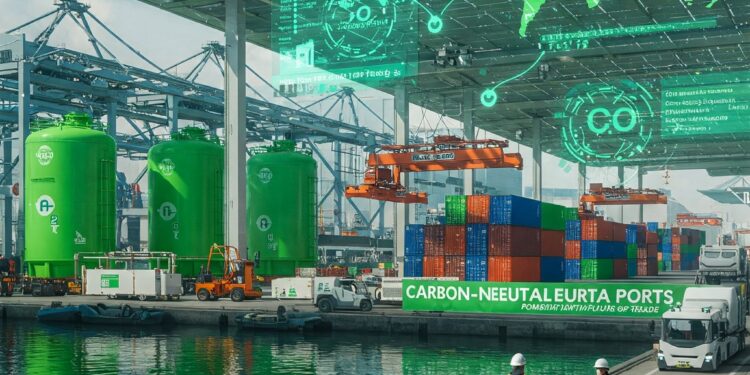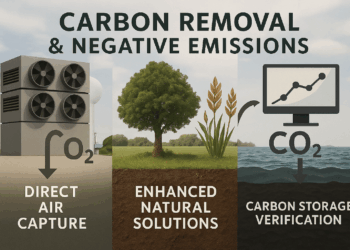In the race to decarbonize the global economy, few sectors remain as overlooked—and as critical—as port infrastructure. These gateways to the global supply chain are more than just logistical nodes; they are high-emission ecosystems where ships, trucks, cranes, and warehouses converge, often spewing pollution into coastal communities and fragile ecosystems.
But 2025 is shaping up to be a turning point. As companies like Maersk reimagine sustainable shipping and nations intensify their net-zero commitments, attention is now shifting to the next logical frontier in climate-smart infrastructure: carbon-neutral ports.
What Is a Carbon-Neutral Port?
A carbon-neutral port is one that reduces its greenhouse gas emissions to net-zero by either eliminating fossil fuel use, increasing energy efficiency, or offsetting any residual emissions through verifiable carbon removal strategies.
This goes far beyond installing solar panels on container cranes. It involves:
-
Electrifying dockside equipment and vehicles
-
Running port operations on renewable energy
-
Facilitating green fuel bunkering (hydrogen, ammonia, methanol)
-
Installing shore power (cold ironing) so ships can plug in rather than burn fuel at berth
-
Deploying smart logistics systems to optimize cargo movement and reduce waste
What was once considered futuristic is quickly becoming essential—and investable.
Why Ports Matter in the Climate Equation
Ports are central to the global carbon ledger. According to the International Maritime Organization (IMO), port operations and associated transport account for a substantial portion of the over 1 billion tons of CO₂ generated by the shipping sector annually. In addition, ports are typically located in densely populated coastal regions, where air pollution from diesel-powered equipment contributes to public health crises, especially in low-income communities.
In this context, carbon-neutral ports aren’t just about reducing emissions—they’re about advancing environmental justice, improving regional air quality, and future-proofing global trade against climate risk.
The Investment Opportunity
The decarbonization of ports is a multi-trillion-dollar investment opportunity poised to reshape the infrastructure landscape. From green bonds and climate-focused private equity to sovereign wealth funds, capital is increasingly flowing into ports that align with sustainable logistics.
Key Investment Areas:
-
Renewable Energy Infrastructure: Solar farms, wind turbines, and microgrids integrated directly into port operations.
-
Battery Storage & Charging Stations: Essential for electrified trucks, cranes, and autonomous cargo movers.
-
Green Hydrogen Facilities: Ports can serve as production and bunkering hubs for low-emission fuels, especially near industrial clusters.
-
Digital Twin Technology: AI-powered port management systems reduce idling, congestion, and energy waste.
-
Carbon Capture & Storage (CCS): Emerging in regions where retrofitting legacy operations is more viable than full electrification.
The return? Lower operational costs, resilience to future climate regulations, and a green brand that attracts sustainability-minded customers and shipping partners.
Case Studies: Early Movers
Port of Rotterdam (Netherlands):
Europe’s largest port has committed to becoming CO₂-neutral by 2050, with investments in hydrogen corridors, smart shipping lanes, and carbon capture pilots already underway.
Port of Los Angeles (USA):
Now testing zero-emission drayage trucks and boasting the world’s largest shore power program, the port has already cut pollution by over 60% since 2005—and is targeting carbon neutrality by 2045.
Port of Singapore:
Launched the world’s first net-zero emissions terminal project, integrating AI, automation, and green energy at scale, and positioning itself as Asia’s green logistics leader.
These examples are shaping global benchmarks—and proving that carbon-neutral ports are both viable and valuable.
Beyond Climate: Why It’s Also About Global Equity
The push for greener ports also intersects with broader justice goals. Port communities—especially in the Global South—have historically suffered from environmental degradation without sharing in the economic benefits of global trade.
Carbon-neutral port development can reverse this by:
-
Creating green jobs in construction, maintenance, and energy sectors
-
Reducing exposure to pollutants in vulnerable populations
-
Supporting local economies through cleaner, more resilient logistics hubs
-
Fostering international cooperation via cross-border energy and trade infrastructure
What Comes Next?
As governments roll out green industrial policies and shipping giants embrace net-zero targets, carbon-neutral ports will become the connective tissue of a sustainable global economy.
But achieving this requires bold public-private partnerships, clear regulatory frameworks, and targeted green finance mechanisms. From the World Bank to climate-focused venture funds, stakeholders are now actively exploring how to scale these efforts globally.
Bottom Line:
The ports of the future won’t just move goods—they’ll move the world toward climate resilience and global justice. For investors, innovators, and policymakers alike, carbon-neutral ports aren’t just a necessity—they’re the next big bet.








